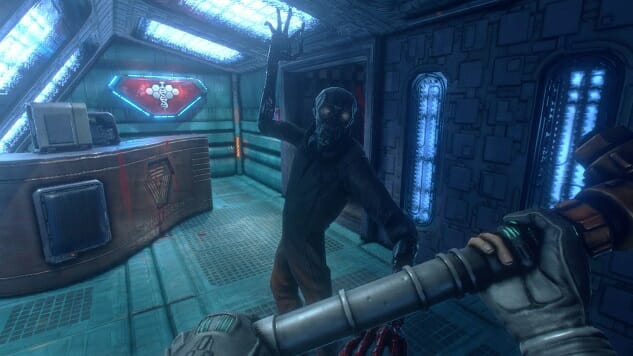
Last week, Nightdive Studios, the creators of a $1.4 million funded Kickstarter to remaster 1994’s System Shock, announced that the project was being put on hiatus in order to “reassess our path so that we can return to our vision.”
While the project update stressed that the game was “NOT ending,” the backlash to the announcement was as swift as you might expect, with Kickstarter backers expressing ample frustration with the lack of communication and lack of visible progress in the update’s comments.
Failed Kickstarters are now a subject with a considerable history, and games aren’t without their ownnotableexamples. Kickstarter itself is adamant that a Kickstarting group or individual is legally required to provide the service or product promised in the pitch, but in practice this is hard to litigate and maintain.
While the exact machinations that happened behind closed doors in development will never be known to the public, even backers, it is important to keep in mind that Kickstarter pledges (in practice) are little more than donations. Enough people want a thing to come into existence that they fund it, but they are not (in a strict sense) investors—pledging money to a Kickstarter campaign entitles you to none of the profits or dividends of the product inherently.
The System Shock hiatus update came about only a month after their previous update, where the team had shared some new concept art and explained in a short FAQ section that the game was still in “pre-production,” another note that some fans in the comments found frustrating. It had been almost two years since the project was fully funded, why had so little progress been (seemingly) made?
The simple answer is that games are hard to make. Kickstarter descriptions for projects often play up the skills of the team or play down costs in order to make funding checkpoints. A team of about a dozen developers all working full-time can easily eat up $1.4 million in funding in a scant year or two, and that’s before going into other costs that are part of the games development process—sound and voice acting, porting fees, et cetera. Due to the circumstances, cases like Nightdive’s are particularly thorny.
Changes of development focus or direction—something that appears to have played a part multiple times in the remastered System Shock’s timeline, according to the most recent campaign update—aren’t things that can be considered in initial funding discussions.
The journey toward games becoming a more diverse and accepting landscape must include having an amount of patience with a small studio working through the kinks of their largest project to date. Game development is a labor of artistic creation, even if the culture surrounding it still treats games as products first and foremost.
Ultimately, what is wrong here is the assumption that by funding a Kickstarter project you are funding a game. You’re not, not directly. You are funding the labor necessary to make a game, and hoping that the labor that is funded (partially) by your money goes to making a game in the timeframe that was outlined in the project’s pitch. If the project isn’t delivered, the Kickstarter still did what it asked for: funding developers to make the game. Hiatuses (and even cancellations) are an unfortunate occurrence in the development process and no amount of Kickstarter guarantees can solve that.
I’m not calling for a boycott of Kickstarter games or of a unilateral disdain for the service—for many games it makes the most sense to fund independently through Kickstarter than through other means. But if we’re going to accept that Kickstarter is part of the games funding landscape, we have to accept that sometimes things don’t work out.
Dante Douglas is a writer, poet and game developer. You can find him on Twitter at @videodante.